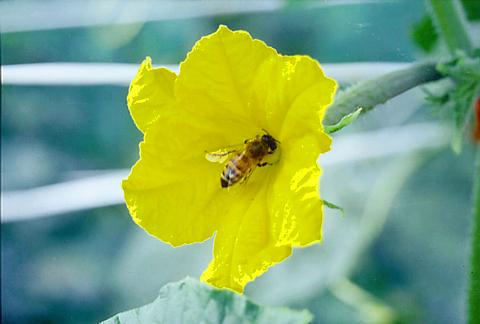Honey products, including royal jelly and pollen, have for generations been the mainstay of beekeepers everywhere. In Taiwan recently, however, attention has been focusing on a new bee product called propolis (
The material, produced naturally in the hive, has been recognized as a "miracle" medicine by many alternative practitioners and is gaining popularity.
At the Hungchi Honeybee Ecological Farm (

PHOTOS: COURTESY OF MIAOLI DISTRICT AGRICULTURAL IMPROVEMENT STA
"Although honey and royal jelly are currently the main source of beekeepers' income, most of us have been encouraged by both scientific research and the government's strategies to put propolis at the center of our business," Lai told the Taipei Times.
According to researchers at the Miaoli District Agricultural Improvement Station (MLDAIS
Liu Tseng-cheng (
"In Greek, `pro' means being in front of something, and `polis' means cities. So propolis is actually a material placed in front of the beehive for defense," Liu said.
"Worker honey bees collect bark secretions -- a resin with a sticky characteristic -- from leaves, buds and trunk wounds on trees and shrubs. They mix it with saliva, pollen and beeswax to form propolis, a resinous yellow-brown to dark brown substance," Liu said.
Why so expensive?
The price set by Lai is not as high as that of many importers, whose business network spreads outward to China, New Zealand, and even South America.
In fact, with the current market focusing on alternative trends in medicine, price is not a problem.
On the global market, the price for propolis extract has stayed high due to its rarity. Scientific studies estimate that a group of 20,000 honey bees produce just 20gm of propolis annually.
A newcomer to the market, propolis did not attract global attention until 1986, when scientists stated at an apiology convention in Nagoya, Japan that the product was a natural antibiotic material.
Since then, a stream of scientific research on propolis -- mostly showing its effects on curing certain diseases and fighting infection -- has created a belief that it is a virtual gift from nature.
Taiwan's Strategies
"It's worthy to promote propolis products because more and more medicinal effects, such as enhanced immunity and resistance to cancer, have been discovered by scientists," said Wu Teng-chen (
Armed with the results of persuasive scientific research, commercial health food vendors have begun spreading the idea that propolis can be used as a cosmetic due to its ability to cleanse, nourish and protect. They also claim propolis can reduce the chances of cancer by inhibiting cancerous cell mutation, enhancing metabolism and thus prolonging life.
Because propolis extract can be made for both internal and external medicinal use, researchers have put more emphasis on promoting the material for commercial use.
"We will make efforts to improve the quality of Taiwan-made propolis to compete with similar products currently available on the global market," said Lin Hsin-shan (
Beekeepers' Hopes
In Nantou, Lai expressed the hope that his ecological honey bee farm will benefit from the COA's strategy to promote propolis products.
"This is a chance for us to recover from the destruction caused by the 921 earthquake," Lai said. His farm was partly damaged by the disaster, causing about NT$1 million in losses.
Lai is also involved with scientific research programs at two other stations nearby being run by scientists from National Taiwan University.
"The quality of Taiwan's propolis is definitely much better than that of other countries, because honey bees here collect resin from high-yield trees such as pine, redwood and cypress," Lai said.
Propolis is usually collected by beekeepers either by scraping the substance from wooden hive parts, or by using specially constructed collection mats.
The raw product undergoes secondary processing to remove beeswax and other impurities before being used in a variety of natural health care products, such as ointments and drinks.
"We beekeepers already have the means to produce propolis. All we need now is a comprehensive strategy to mass produce and develop broad marketing strategies," Lai said.

US PUBLICATION: The results indicated a change in attitude after a 2023 survey showed 55 percent supported full-scale war to achieve unification, the report said More than half of Chinese were against the use of force to unify with Taiwan under any circumstances, a survey conducted by the Atlanta, Georgia-based Carter Center and Emory University found. The survey results, which were released on Wednesday in a report titled “Sovereignty, Security, & US-China Relations: Chinese Public Opinion,” showed that 55.1 percent of respondents agreed or somewhat agreed that “the Taiwan problem should not be resolved using force under any circumstances,” while 24.5 percent “strongly” or “somewhat” disagreed with the statement. The results indicated a change in attitude after a survey published in “Assessing Public Support for (Non)Peaceful Unification

The CIA has a message for Chinese government officials worried about their place in Chinese President Xi Jinping’s (習近平) government: Come work with us. The agency released two Mandarin-language videos on social media on Thursday inviting disgruntled officials to contact the CIA. The recruitment videos posted on YouTube and X racked up more than 5 million views combined in their first day. The outreach comes as CIA Director John Ratcliffe has vowed to boost the agency’s use of intelligence from human sources and its focus on China, which has recently targeted US officials with its own espionage operations. The videos are “aimed at

‘MISGUIDED EDICT’: Two US representatives warned that Somalia’s passport move could result in severe retaliatory consequences and urged it to reverse its decision Minister of Foreign Affairs Lin Chia-lung (林佳龍) has ordered that a special project be launched to counter China’s “legal warfare” distorting UN Resolution 2758, a foreign affairs official said yesterday. Somalia’s Civil Aviation Authority on Wednesday cited UN Resolution 2758 and Mogadishu’s compliance with the “one China” principle as it banned people from entering or transiting in the African nation using Taiwanese passports or other Taiwanese travel documents. The International Air Transport Association’s system shows that Taiwanese passport holders cannot enter Somalia or transit there. The Ministry of Foreign Affairs (MOFA) protested the move and warned Taiwanese against traveling to Somalia or Somaliland

Four former Hong Kong opposition lawmakers jailed in the territory’s largest national security case were released yesterday after more than four years in prison, the first among dozens convicted last year to regain their freedom. Former legislators Claudia Mo (毛孟靜), Jeremy Tam (譚文豪), Kwok Ka-ki (郭家麒) and Gary Fan (范國威) were part of a group of 47 public figures — including some of Hong Kong’s best-known democracy advocates — who were charged with subversion in 2021 for holding an informal primary election. The case fell under a National Security Law imposed on the territory by Beijng, and drew international condemnation and warnings